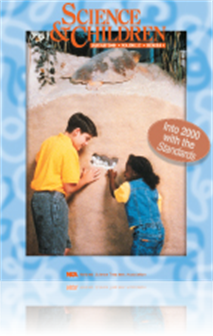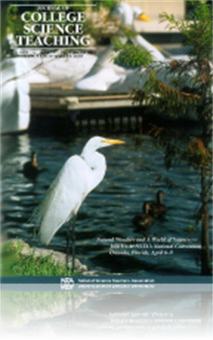All Resources
Journal Article
Analyzing the <em>Standards</em>: Looking at using and possibly misusing the science standards
Be they from Benchmarks for Science Literacy, the National Science Education Standards, or a state curriculum framework, standards offer educators a c...
Journal Article
The U.S. science education community has been alternately encouraged and disheartened by the results of the Third International Mathematics and Scienc...
Journal Article
It is very important to show how open-mindedness and tolerance, or their lack, function in social situations. Ask the pupils to cite personal experien...
Journal Article
In general, the way that introductory courses in science are taught leads students to a limited view of science: science as totally objective—as the...
Journal Article
Student-Centered Seismology Activities
This article describes a three-week unit on earthquakes, a high-interest topic that is no doubt taught in most science classrooms. But in this unit, s...
Journal Article
Fan-powered cars are a great way to explore the concept of motion. The handheld fan allows students to control the force acting on the car, thus elimi...
Journal Article
The New Curriculum Movement in Science
The new science courses differ in purpose from traditional courses and so do the tests. A student is first of all required to understand the facts, fo...
Journal Article
Shrimp Farming in the Classroom
In inquiry-based instruction, discovery and learning belong to the students. In this exploration, jumbo shrimp are the source of inspiration. The magi...
Journal Article
In this article, the author shares how she developed a unit of study aligned with the Standards that focused on the question “Why do plants have flo...
Journal Article
Reaching to the <em>Standards</em>
Sharing inquiry-based teaching ideas with preservice and in-service teachers, other colleagues, and parents will only enhance how science is taught to...
Journal Article
The Social Responsibilities of Scientists and Science
The following article is based on Dr. Pauling’s address at the annual Convention of the National Science Teachers Association in New York City, Apri...
Journal Article
“Science is About Facts,” or Is It? Changing Student Conceptions About the Nature of Science
This paper analyzes some of the issues in teaching and learning in an introductory physical science course to a group of nonscience majors: elementary...
Journal Article
The Case Study: Cooking with Betty Crocker—A Recipe for Case Writing
This column provides original articles on innovations in case study teaching, assessment of the method, as well as case studies with teaching notes. T...
Journal Article
This lab exercise investigates and compares the carbon monoxide content of automobile exhaust and cigarette smoke. The experiment uses gas chromatogra...
Journal Article
Incorporating dramatizations into science classes is a useful strategy for demonstrating phenomena that are difficult or impossible to observe directl...







